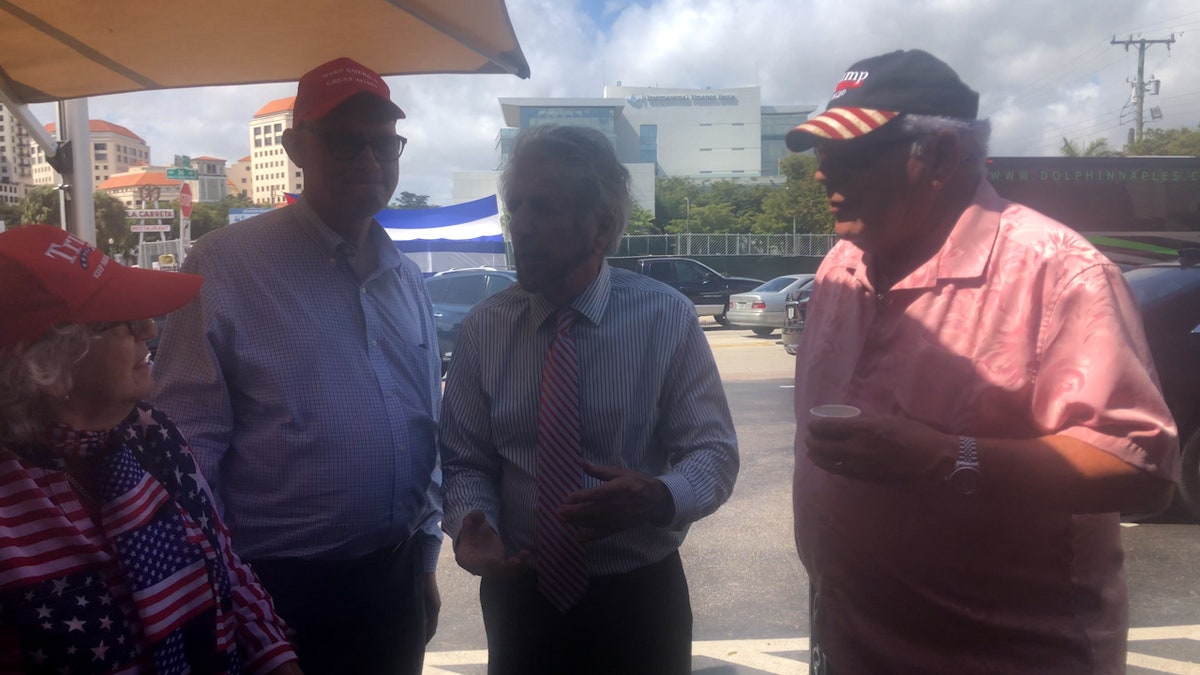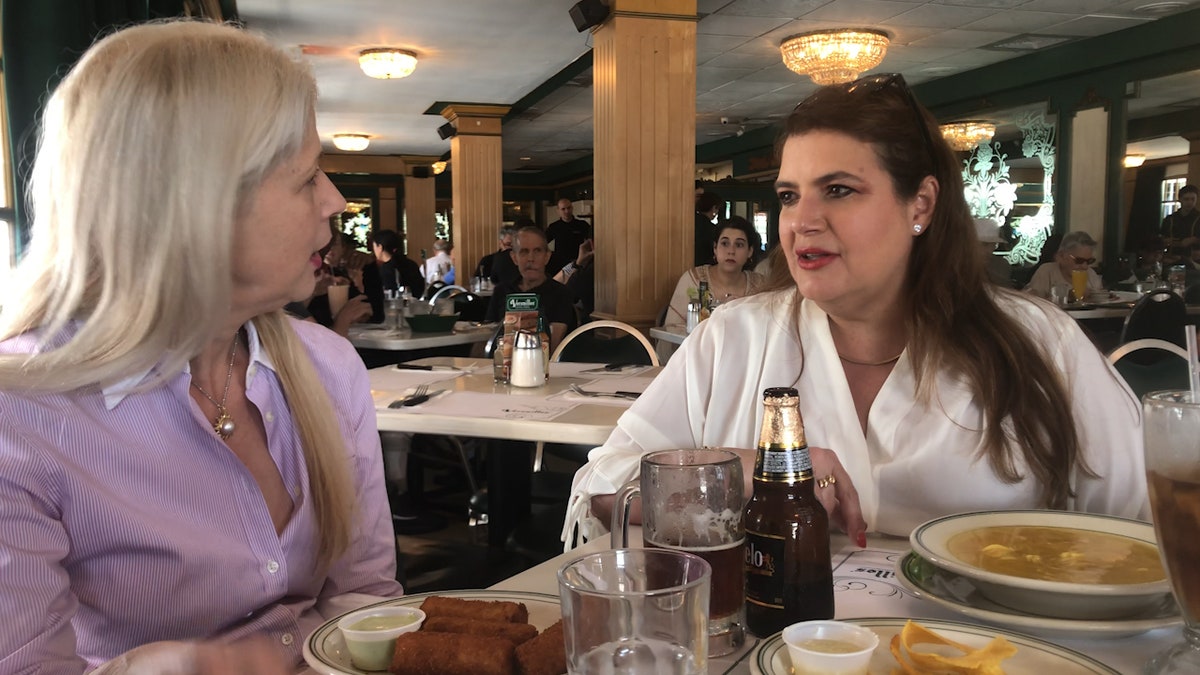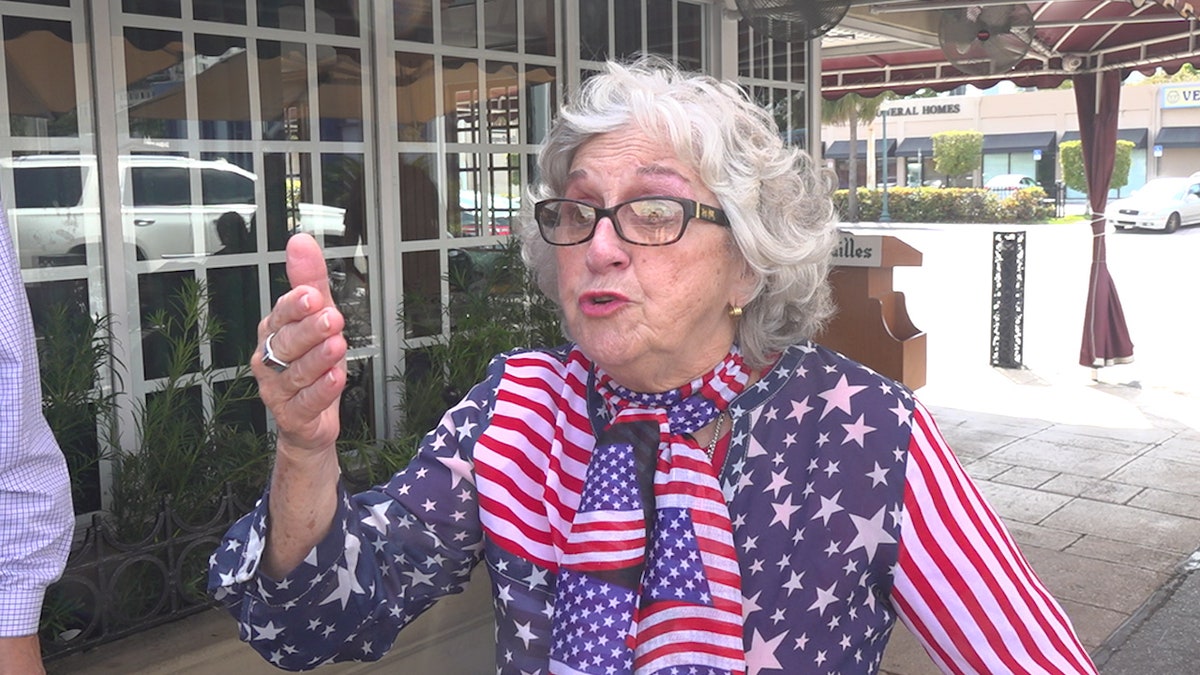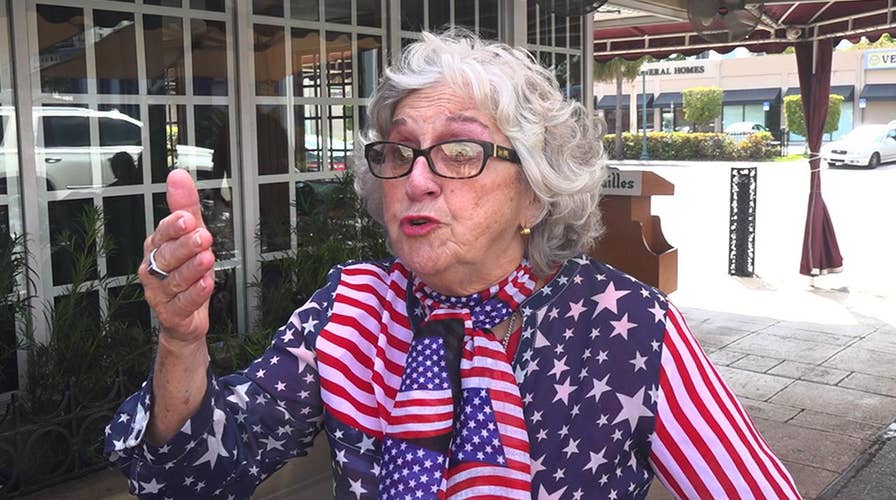Florida's Cuban and Venezuelan voters alarmed by socialist Bernie Sanders' rise.
Political analysts say some of Sanders government run policy ideas has some moderate voters running the other way and possibly towards Trump.
MIAMI -- Versailles, the iconic restaurant in the heart of Little Havana, has for decades been Miami’s political hub and a must-stop for politicians trying to court Cuban-Americans votes.
As people sip cafecito and eat croquetas at the landmark restaurant, the buzz here these days is what Cubans say is the alarming rise of Democratic presidential frontrunner Sen. Bernie Sanders, whose unabashed defense of late Cuban dictator Fidel Castro has riled Cuban-Americans who view his comments as a personal attack.
In this critical swing state, Cubans in the Miami area — once largely Republican, but with a younger generation that leans more liberal — are used to being heavily wooed by political candidates who count on their support to win votes in South Florida. But Sanders’ growing popularity – even after expressing sympathetic views of Castro and other authoritarian regimes – underscores a problem for Florida Democrats, especially in South Florida, which has a large number of Cubans, Venezuelans and Nicaraguans whose families suffered under dictators.

While Cuban restaurant Versailles is famous for it's strong cuban coffee and delicacies, what they are really as is a backdrop for political events and discussion amongst the community. (Elina Shirazi)
"For me, it's very, very insulting and very sad that we are in a country, we left countries where we were running from or escaping from communism and the oppression of human rights violations, to come here and now be in a country where the front-runner for the Democratic nominee is a known communist sympathizer," said Maria Fernandez Gomez, a voter with Cuban roots. “He has turned off all of the Cuban population in Miami and I would venture to say the Venezuelan population, Nicaraguan population, because of those comments that he has made."
BERNIE SANDERS 'RATTLED' BY DEBATE CROWD'S PUSHBACK ON HIS PRAISE FOR CUBA, FRANK LUNTZ SAYS
Gomez said Sanders' rhetoric is not only offensive, it’s personal. Her family left Cuba in the 1970s, and they came to Florida after being among the few lucky Cubans to take "Freedom Flights" to Spain.
"My father was military age when he was getting ready to leave Cuba," Gomez said. "They wouldn't let him out. He was an anti-revolutionary and a political prisoner so this hits close to home for me.”
There are 1.3 million Cubans living in Florida. Estimates of how many Venezuelans live in the state range from about 60,000 to 100,000. Those numbers are critical in a purple state where just a few thousand votes could swing the election.
"The reality is that in a state that is a 2 percent state, it's very important. Sixty thousand votes could make the difference. Cubans are clearly far and beyond the most important,” said Eduardo Gamarra, a Florida International University politics professor. “Among Hispanics, the big issue is that Bernie has kind of become the caricature of what the Republicans have painted."

In the iconic Cuban restaurant called Versailles, located in the heart of Little Havana, dozens of Latinos gathered around to sip strong coffee and talk politics. What’s on most of their minds? A fear of the rising Democratic frontrunner, Sen. Bernie Sanders, I-Vt.,who as of late stunned a majority of their community. (Elina Shirazi)
Gamarra said if Sanders wins the nomination, it will be difficult, if not impossible, for the Cuban and Venezuelan Democrats in Florida to back him.
"For Republicans, it will be Christmas in August if Bernie gets the nomination. I think it might even mobilize people to vote against the Democrats," he said.
In a recent "60 Minutes" interview, Sanders said: "We’re very opposed to the authoritarian nature of Cuba but it’s unfair to say everything’s bad. When Castro came into office, you know what he did? He had a literacy program."
VENEZUELANS BECOMING A GROWING POLITICAL AND CULTURAL FORCE IN SOUTH FLORIDA
He has also infamously praised the Cuban revolution as "profound," saying it provided the country's people with "free health care, free education, and free housing."
The comments certainly have not endeared him to the Cuban-American community, a once strong Republican voting bloc that has been leaning left in recent years.
"I am a Cuban Democrat. I watched the interview with Bernie Sanders. I am not a supporter of his to begin with but that put the nail in the coffin for me. There is nothing good with the Castro regime," said Raquel Robaina, a Cuban immigrant.
Born in 1960 in Havana, Robaina said she arrived in Miami when she was two months old. She says many Democrats — including herself — are completely turned off by how out of touch Sanders is with voters like herself.
"He stated literacy as his example of something good," Robaina said. "Literacy is education. Who cares if someone can read at a high level if all they're reading is propaganda and lies and they have no freedom of thought -- that is not education. That is indoctrination. Moderate Democrats, we do not agree at all with Bernie Sanders's line of thinking."
Venezuelan immigrants sing the same tune, saying they fled the brutal Maduro regime with only the clothes on their back. Sanders was the only Democratic candidate to turn a blind eye to the Trump administration's recognition of Venezuelan opposition leader Juan Guaidó as that country's president.
"I am a business owner now. I left Venezuela in 1994 but my family is living there, and it's a perfect example, this situation happening in Venezuela, between living in democracy and living in socialism. Most of the people I know are really scared of Bernie Sanders. He will have no opportunity here in Florida," said Luis Blanco, a Venezuelan immigrant who owns a burger joint in Sweetwater.
Those comments were echoed by Elias Attie, 20, a Venezuelan immigrant who came to Florida two years ago.
"We don’t want to pass the same thing as in Venezuela, because in Venezuela we know what happened and we don’t want that to happen here in U.S.,” Attie said. “That is the reason I left."

Maria Fernandez Gomez, pictured on the right, says her father was anti-revolutionary and a political prisoner in Cuba, before they fled the country. She was one of the few who took "Freedom Flights" to Spain. The two are pictured having lunch at Versailles, a popular Cuban restaurant in Little Havana.
Besides his rhetoric, political analysts say some of Sanders' government-run policy ideas, like his push for “Medicare-for-all,” has some moderate Latino voters running the other way and possibly toward Trump.
Maria Falcon, 85, who left Cuba for Miami 40 years ago, said she’s lived in a socialist country and it’s not as wonderful as Sanders is portraying it to be.

Eighty-five-year-old Maria Falcon says she came to Miami 40 years ago. Wearing a red, white and blue star spangled U.S.A themed outfit, she held nothing back, speaking in both English and Spanish. (Elina Shirazi)
"Bernie Sanders likes everything free. Giving food stamps. University free … he never lived in Cuba! If you lived in Cuba, you know that it is communism, repression. People are hungry, they are not given anything for free," Falcon said.
CLICK HERE TO GET THE FOX NEWS APP
While Sanders' future in Florida still remains uncertain, Latino voters here are preparing to cast their ballots on March 17 in the state’s primary.




